 What happens when you die? Is there an intermediate state? What does the bible teach about the dead before resurrection? These questions are important for our study of the kingdom of God. If you go straight to heaven when you die, you’re not going to care very much about what happens when Jesus returns. You may find it marginally interesting, but it’s what’s next for you. In this way, the doctrine of heaven-at-death eclipses Jesus’ gospel of the kingdom. However, as it turns out, the bible teaches that the dead are asleep until the resurrection on the last day. In this lecture you’ll learn the primary texts that support conditional immortality and you’ll see how this Hebrew notion compares to what other cultures and religions say about the afterlife.
What happens when you die? Is there an intermediate state? What does the bible teach about the dead before resurrection? These questions are important for our study of the kingdom of God. If you go straight to heaven when you die, you’re not going to care very much about what happens when Jesus returns. You may find it marginally interesting, but it’s what’s next for you. In this way, the doctrine of heaven-at-death eclipses Jesus’ gospel of the kingdom. However, as it turns out, the bible teaches that the dead are asleep until the resurrection on the last day. In this lecture you’ll learn the primary texts that support conditional immortality and you’ll see how this Hebrew notion compares to what other cultures and religions say about the afterlife.
This is lecture 6 of the Kingdom of God class, originally taught at the Atlanta Bible College. To take this class for credit, please contact ABC so you can do the work necessary for a grade.
Notes:
difference between conditional immortality and natural immortality
- natural means immortality is part of nature
- conditional means immortality is conditioned on God giving it
death is sleep (sleep = not awake)
- RIP = rest in peace
sleep is the dominant metaphor the bible uses to talk about death
- David slept with his fathers
- 1 Kings 2.10 10 Then David slept with his fathers and was buried in the city of David.
- Solomon slept with his fathers
- 1 Kings 11.43 43 And Solomon slept with his fathers and was buried in the city of David his father. And Rehoboam his son reigned in his place.
- Jeroboam slept with his fathers
- 1 Kings 14.20 20 And the time that Jeroboam reigned was twenty-two years. And he slept with his fathers, and Nadab his son reigned in his place.
- death is lying down, quietly in sleep, and at rest
- Job 3.11, 13-14, 17, 19
11 “Why did I not die at birth, come out from the womb and expire?…13 For then I would have lain down and been quiet; I would have slept; then I would have been at rest, 14 with kings and counselors of the earth who rebuilt ruins for themselves…17 There the wicked cease from troubling, and there the weary are at rest…19 The small and the great are there, and the slave is free from his master.
- Job 3.11, 13-14, 17, 19
- the dead know nothing and do nothing
- Ecclesiastes 9.5, 10
5 For the living know that they will die, but the dead know nothing, and they have no more reward, for the memory of them is forgotten…10 Whatever your hand finds to do, do it with your might, for there is no work or thought or knowledge or wisdom in Sheol, to which you are going.
- Ecclesiastes 9.5, 10
- no remembrance or praise of God in sheol
- Psalm 6.4-5
4 Turn, O LORD, deliver my life; save me for the sake of your steadfast love. 5 For in death there is no remembrance of you; in Sheol who will give you praise?
- Psalm 6.4-5
- help me or else I’ll sleep the sleep of death
- Psalm 13.3 Consider and answer me, O LORD my God; light up my eyes, lest I sleep the sleep of death,
- the dead do not praise the LORD
- Psalm 115.17 The dead do not praise the LORD, nor do any who go down into silence.
- breath [ruach/spirit] departs, return to earth, plans perish
- Psalm 146.3-4
3 Put not your trust in princes, in a son of man, in whom there is no salvation. 4 When his breath departs, he returns to the earth; on that very day his plans perish.
- Psalm 146.3-4
- Jesus calls Lazarus asleep when he is dead
- John 11.11-14
11 After saying these things, he said to them, “Our friend Lazarus has fallen asleep, but I go to awaken him.” 12 The disciples said to him, “Lord, if he has fallen asleep, he will recover.” 13 Now Jesus had spoken of his death, but they thought that he meant taking rest in sleep. 14 Then Jesus told them plainly, “Lazarus has died”
- John 11.11-14
- David died, was buried, and did not ascend into heaven
- Acts 2.29, 34
29 “Brothers, I may say to you with confidence about the patriarch David that he both died and was buried, and his tomb is with us to this day… 34 For David did not ascend into the heavens, but he himself says, “‘The Lord said to my Lord, “Sit at my right hand”
- Acts 2.29, 34
- Stephen cried out and then fell asleep
- Acts 7.60 And falling to his knees he cried out with a loud voice, “Lord, do not hold this sin against them.” And when he had said this, he fell asleep.
death is like time travel
- ex 1: fall asleep in car and wake up a couple of hours later
- ex 2: getting wisdom teeth removed
- two perspectives
- from one point of view king David has waited in the grave for 3,000 years
- from David’s perspective he instantaneously goes from his last breath to the resurrection
resurrection is the key to immortality
- this is how someone escapes death and acquires immortality
- corporate event
- Daniel 12.2 And many of those who sleep in the dust of the earth shall awake, some to everlasting life, and some to shame and everlasting contempt.
- Jesus is the resurrector
- John 5.28-29
28 Do not marvel at this, for an hour is coming when all who are in the tombs will hear his voice 29 and come out, those who have done good to the resurrection of life, and those who have done evil to the resurrection of judgment.
- John 5.28-29
- resurrection doesn’t happen when you die, but when Jesus returns
- 1 Corinthians 15.20-23
20 But in fact Christ has been raised from the dead, the firstfruits of those who have fallen asleep. 21 For as by a man came death, by a man has come also the resurrection of the dead. 22 For as in Adam all die, so also in Christ shall all be made alive. 23 But each in his own order: Christ the firstfruits, then at his coming those who belong to Christ.
- 1 Corinthians 15.20-23
Ancient Ideas about the Afterlife (from Wikipedia)
Egyptian: At death, the soul goes to the kingdom of the dead where it must recite secret formulae from the Book of the Dead. Judgment involves the demon Ammit devouring an unworthy soul, whereas the good would live on in the Fields of Yalu and accompany the sun on its daily ride. Only those who could secure embalming and a sarcophagus had a way into the afterlife.
Greek: On death, Hermes takes the dead soul to the shores of the river Styx in the realm of the god Hades. Charon, the ferry-man, brings the deceased across the river. Based on how someone lived, he or she would go to Elysium (paradise for the good and heroic), the Asphodel Fields (for people who did as much bad as good), the Punishing Fields (for the mediocre bad), or Tartarus (a place of torment by hot lava or the rack).
Norse: The soul stays in the body until released through decay or cremation. It goes to one of four places: Valhalla (where warriors who die in battle join Odin in Asgard), Folkvangr (a great meadow where Freyja reigns), Hel (a place where those who are neither good nor bad go to reunite with loved ones), or Niflhel (punishment for those who break oaths or commit wickedness).
Zoroastrian: Zoroastrians are dualists who believe that matter itself is a corruption. At death, Ahirman, the evil god, enters the body and contaminates it, whereas the immaterial spirit escapes to remain in the vicinity for three days and nights and suffers anxiety from the recent separation. The angels Vohuman and Mithra prepare an account of good and evil the person committed. Once Daena leads the soul into the spiritual world, it must cross a Bridge of Judgment. Good souls enter a paradise, and evil ones a realm of punishment.
Buddhist: At death, the person reincarnates based on the qualities of that one’s actions (karma) to higher or lower forms of life. For Buddhists, the soul is not eternal, and believing so is a prime consequence of ignorance. When one succeeds in eliminating desire, delusion, and ignorance, he or she can escape the cycle and cease existence.
Hindu: After death, an immortal soul reincarnates, based on one’s deeds. Eventually one can escape the cycle by improving his or her karma over many lifetimes and enter a state of perpetual disembodied bliss.
Taoist: A goal for Taoists is to achieve immortality through breathing techniques (meditation), sexual practices, physical exercises (yoga), purified metals ingestion (gold), and moral living with the goal of eliminating impurities and demons from their bodies to increase their soul’s energy.
breakdown of beliefs today
- Barna [1]
- 81% of Americans believe in an afterlife
- 9% are uncertain
- 10% death is the end
- 79% believe everyone has a soul that will live forever
- 64% believe they will go to heaven
- Pew [2]
- 89% of American adults believe in God
- 72% believe that they will be eternally rewarded in heaven
- 58% believe hell is a place where people who led bad lives are punished
Isaac Asimov, the prolific twentieth century author, well expressed his confusion over the popular options:
Imagination has never managed to build up a serviceable Heaven, however. The Islamic Heaven has its houris, ever available and ever virginal, so that it becomes an eternal sex house. The Norse Heaven has its heroes feasting at Valhalla and fighting each other between feasts, so that it becomes an eternal restaurant and battlefield. And our own Heaven is usually pictured as a place where everyone has wings and plunks a harp in order to sing unending hymns of praise to God.
What human being with a modicum of intelligence could stand any of such Heavens, or the others that people have invented, for very long? Where is there a Heaven with an opportunity for reading, for writing, for exploring, for interesting conversation, for scientific investigation? I never heard of one.
If you read John Milton’s Paradise Lost, you will find that his Heaven is described as an eternal sing-along of praise to God. It is no wonder that one-third of the angels rebelled. When they were cast down in Hell they then engaged in intellectual exercises (read the poem if you don’t believe me) and I believe that, Hell or not, they were better off. When I read it, I sympathized strongly with Milton’s Satan and considered him the hero of the epic, whether Milton intended that or not.
But what is my belief? Since I am an atheist and do not believe that either God or Satan, Heaven or Hell, exists, I can only suppose that when I die, there will only be an eternity of nothingness to follow. After all, the Universe existed for 15 billion years before I was born and I (whatever “I” may be) survived it all in nothingness.
People may well ask if this isn’t a bleak and hopeless belief. How can I live with the specter of nothingness hanging over my head?
I don’t find it a specter. There is nothing frightening about an eternal dreamless sleep. Surely it is better than eternal torment in Hell or eternal boredom in Heaven.[3]
Why is it like this? How did so many come to think this way?
- What did the serpent tell Eve in the garden? The serpent said to the woman, “You surely will not die” (Gen 3:4). Yet, each of the faiths described above, along with many modern Jews, Christians, and Muslims, believe that death is no more than the separation of the soul from the body.
Socrates vs. Jesus
(cf. Oscar Cullmann)
- Plato’s book, the Phaedo, defended the doctrine of the immortality of the soul
- Phaedo: “It never occurred to me to feel sorry for him, as you might have expected me to feel at the deathbed of a very close friend. The man actually seemed quite happy, Echecrates, both in his manner and in what he said; he met his death so fearlessly and nobly. “[4]
- “‘Ordinary people seem not to realize that those who really apply themselves in the right way to philosophy are directly and of their own accord preparing themselves for dying and death. If this is true, and they have actually been looking forward to death all their lives, it would of course be absurd to be troubled when the thing comes for which they have so long been preparing and looking forward’[5]…
‘Do we believe that there is such a thing as death?’
‘Most certainly,’ said Simmias in reply.
‘Is it simply the release of the soul from the body? Is death nothing more or less than this, the separate condition of the body by itself when it is released from the soul, and the separate condition by itself of the soul when released from the body? Is death anything else than this?’
‘Certainly not, Socrates,’ said Simmias.[6]
…‘Surely the soul can reason best when it is free of all distractions such as hearing or sight or pain or pleasure of any kind—that is, when it leaves the body to its own devices, becomes as isolated as possible, and strives for reality while avoiding as much physical contact and association as it can.’
‘That is so.’
‘Then here again the philosopher’s soul is most disdainful of the body, shunning it and seeking to isolate itself.’[7]
…‘So long as we keep to the body and our soul is contaminated with this imperfection, there is no chance of our ever attaining satisfactorily to our object, which we assert to be Truth. In the first place, the body provides us with innumerable distractions in the pursuit of its necessary sustenance, and any diseases which attack us hinder our quest for reality. Besides, the body fills us with loves and desires and fears and all sorts of fancies and a great deal of nonsense, with the result that we literally never get an opportunity to think at all about anything…Worst of all, if we do obtain any leisure from the body’s claims and turn to some line of inquiry, the body intrudes once more into our investigations, interrupting, disturbing, distracting, and preventing us from getting a glimpse of the truth. We are in fact convinced that if we are ever to have pure knowledge of anything we must get rid of the body and contemplate things in isolation with the soul in isolation. It’s likely, to judge from our argument, that the wisdom which we desire and upon which we profess to have set our hearts will be attainable only when we are dead, and not in our lifetime.[8]’” - after a long while of talking Socrates drank the poison
- he asks his executioner, “Well my good fellow, you understand these things; what ought I to do?”
- executioner, “Just drink it and then walk about until you feel a weight in your legs, and then lie down. Then it will act of its own accord.”
- Socrates received the cup cheerfully w/o a tremor, w/o a change of expression
- calmly and w/ no sign of distaste he drained the cup in one gulp
- everyone started crying
- Socrates rebuked them: “calm yourselves and be brave”
- he walked around and his legs grew heavy
- he lay down
- soon the poison reached his heart
- last words, “Crito, we ought to offer a rooseter to Asclepius. See to it, and don’t forget.”
Now consider Jesus
- once again we have a rooster and a cup
- Mark 14.27-42
30 And Jesus said to him, “Truly, I tell you, this very night, before the rooster crows twice, you will deny me three times.” 31 But he said emphatically, “If I must die with you, I will not deny you.” And they all said the same. 32 And they went to a place called Gethsemane. And he said to his disciples, “Sit here while I pray.” 33 And he took with him Peter and James and John, and began to be greatly distressed and troubled. 34 And he said to them, “My soul is very sorrowful, even to death. Remain here and watch.” 35 And going a little farther, he fell on the ground and prayed that, if it were possible, the hour might pass from him. 36 And he said, “Abba, Father, all things are possible for you. Remove this cup from me. Yet not what I will, but what you will.” 37 And he came and found them sleeping, and he said to Peter, “Simon, are you asleep? Could you not watch one hour? 38 Watch and pray that you may not enter into temptation. The spirit indeed is willing, but the flesh is weak.” 39 And again he went away and prayed, saying the same words. 40 And again he came and found them sleeping, for their eyes were very heavy, and they did not know what to answer him. 41 And he came the third time and said to them, “Are you still sleeping and taking your rest? It is enough; the hour has come. The Son of Man is betrayed into the hands of sinners. 42 Rise, let us be going; see, my betrayer is at hand.” - death is an enemy;
- an evil to be resisted
- not a friend to be embraced
- Jesus faced death courageously
- not thinking his true self would escape his body
- (v28) “after I am raised up, I will go before you to Galilee”
- the biblical solution to death is resurrection
- Greek philosophy teaches denial
- the bible is realistic
- Mark 14.61-62 61 But he remained silent and made no answer. Again the high priest asked him, “Are you the Christ, the Son of the Blessed?” 62 And Jesus said, “I am, and you will see the Son of Man seated at the right hand of Power, and coming with the clouds of heaven.”
who are you with?
- Jesus or Socrates?
- Plato or Paul?
- is death no more than the separation of the soul from the body or an enemy to conquer in resurrection?
only so many options out there for the afterlife:
- evacuation {72% of Americans}
- reincarnation {Hindus, Buddhists, Jains, Sikhs)
- annihilation {atheists, agnostics, non-religious}
- restoration {Some Christians, Muslims, and Jews}
- spatial
- temporal
why bring up the Intermediate State in a class on the kingdom?
- heaven-at-death eclipses the kingdom
- who cares what Jesus is going to do when he returns if I immediately get my reward at death?
- reduces kingdom to interesting but not relevant
[1] Barna Group Survey in 2003: https://barna.org/component/content/article/5-barna-update/45-barna-update-sp-657/128-americans-describe-their-views-about-life-after-death
[2] Pew Research Survey in 2014: http://www.pewresearch.org/fact-tank/2015/11/10/most-americans-believe-in-heaven-and-hell/
[3] Isaac Asimov, I.Asimov (New York: Random House 2009), ch. 108.
[4] Phaedo 58e
[5] Phaedo 64a
[6] Phaedo 64c
[7] Phaedo 65c
[8] Phaedo 66b-e
Links:
- Other Restitutio podcasts and posts on the kingdom of God
- visit KingdomUprising.com for more resources on the kingdom
- check out Anthony Buzzard’s The Coming Kingdom of the Messiah and Greg Deuble’s They Never Told Me This in Church
- Intro music: “District Four” by Kevin MacLeod. Licensed under Creative Commons: By Attribution 3.0 License.

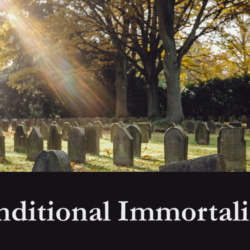
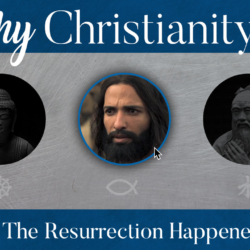
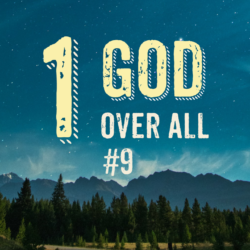

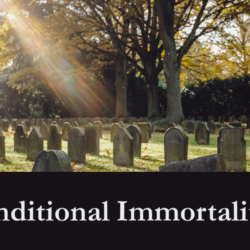
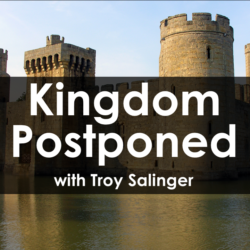
Great lecture Sean! I’m still not 100% convinced about “soul Sleep” theology, more like 98% convinced. I certainly adhere to the resurrection, Messianic Kingdom and subsequent World to Come (Olam Haba) and I fully agree that we do not ascend to heaven in a celestial being type state upon death. I was wondering if you had, or possibly could produce, a exegetical podcast on 2 Corinthians 4:16-5:10. It’s not that I struggle with this passage, but it is a difficult one to make sense of. I’d love to hear your interpretation on this passage. Thanks!
Brian,
I was trying to think of a resource for you on 2 Corinthians 5.8 and I found a couple of good ones. Essentially the conidionalist perspective on 2 Corinthians 5 is pretty simple–just read v8 within the context. Paul had already said he didn’t want to be found naked (i.e. a disembodied soul). He says “We [plural] would rather be absent from the body [singular; maybe “body of Christ?”] and at home with the Lord [presumably in a resurrected body]”.
Anyhow, here’s an interview I did with David Burge (now deceased) of New Zealand where I asked him to answer all of the most difficult verses. Also, here’s a video I did a looong time ago with a friend on 2 Cor 5.8. It might not play on certain devices, but we do around 20 minutes discussing this text. Lastly, here’s a bunch more resources, including videos, audios, articles, and books on this subject.
Thanks Sean. These help!